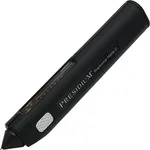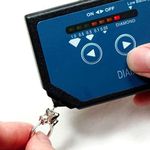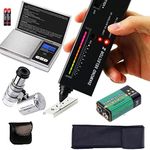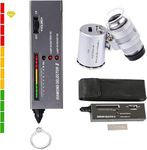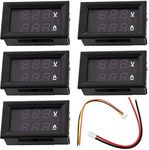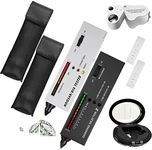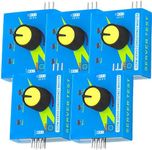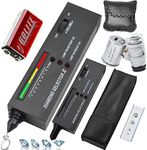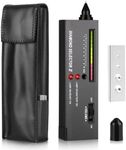Buying Guide for the Best Diamond Testers
Choosing the right diamond tester is crucial for anyone involved in buying, selling, or appraising diamonds. A diamond tester is a tool used to determine whether a gemstone is a real diamond or a simulant. When selecting a diamond tester, it's important to consider the accuracy, ease of use, and the types of stones it can test. Understanding the key specifications will help you make an informed decision that suits your specific needs, whether you're a professional jeweler or a casual buyer.Testing MethodThe testing method refers to how the diamond tester determines the authenticity of a diamond. There are primarily two types: thermal conductivity testers and electrical conductivity testers. Thermal testers measure how quickly heat passes through the stone, which is effective for distinguishing diamonds from most simulants. Electrical testers, on the other hand, measure electrical conductivity and can differentiate between diamonds and moissanite, a common diamond simulant. If you frequently encounter moissanite, an electrical tester might be more suitable. For general use, a thermal tester is often sufficient.
AccuracyAccuracy is a measure of how reliably the tester can distinguish between real diamonds and other stones. High accuracy is crucial to avoid false positives or negatives, which can lead to costly mistakes. Testers with higher accuracy often come with advanced features and may be more expensive. If you are a professional who deals with high-value transactions, investing in a highly accurate tester is advisable. For casual use, a tester with moderate accuracy might suffice, but always check reviews and ratings to ensure reliability.
Ease of UseEase of use refers to how simple and intuitive the diamond tester is to operate. This includes the design of the device, the clarity of the instructions, and the user interface. A tester that is easy to use will save time and reduce the likelihood of user error. If you are new to using diamond testers, look for models with straightforward instructions and a user-friendly design. Professionals might prefer testers with more features, but these should still be easy to navigate to ensure efficiency.
PortabilityPortability is about how easy it is to carry and use the diamond tester on the go. This is particularly important for jewelers or appraisers who travel frequently. Portable testers are typically lightweight and battery-operated, allowing for use in various locations. If you need to test diamonds in different settings, a portable tester is essential. For stationary use, such as in a store or office, portability might be less of a concern, and you can opt for a larger, more robust model.
Battery LifeBattery life indicates how long the diamond tester can operate before needing a recharge or battery replacement. Longer battery life is beneficial for those who use the tester frequently or in locations where recharging is inconvenient. If you plan to use the tester extensively throughout the day, look for models with long-lasting batteries or those that offer quick charging options. For occasional use, battery life might be less critical, but it's still worth considering to avoid interruptions during testing.
Compatibility with Gem TypesCompatibility with gem types refers to the range of stones the tester can accurately assess. Some testers are designed specifically for diamonds, while others can test a variety of gemstones, including moissanite and other simulants. If you work with a wide range of gemstones, a tester with broader compatibility will be more versatile and useful. For those focused solely on diamonds, a tester specialized in diamond testing might be more appropriate and potentially more accurate.
